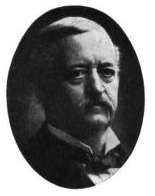John W. Morton (Tennessee politician)
John Watson Morton (September 19, 1842 – November 21, 1914) was an American Confederate veteran, farmer and politician. He served as captain of artillery under General Nathan Bedford Forrest in the Confederate States Army during the American Civil War, and he was the founder of the Nashville chapter of the Ku Klux Klan after the war. He served as the Tennessee Secretary of State from 1901 to 1909.
John Watson Morton | |
|---|---|
 | |
| Born | September 19, 1842 |
| Died | November 21, 1914 (aged 72) Memphis, Tennessee, U.S. |
| Resting place | Mount Olivet Cemetery, Nashville, Tennessee, U.S. |
| Education | Western Military Institute |
| Alma mater | University of Nashville |
| Occupation | Farmer |
| Political party | Democratic Party |
| Spouse(s) | Annie Humphreys Ellen Bourne Tynes |
| Children | 2 sons, 1 daughter |
| Parent(s) | John A. Morton Sarah Buchanan |
| Relatives | West Hughes Humphreys (1st father-in-law) |
| Military career | |
| Allegiance | |
| Service/ | |
| Years of service | 1861–1865 |
| Rank | |
Early life
John Watson Morton was born on September 19, 1842 in Williamson County, Tennessee.[1][2] His father was Dr John A. Morton and his mother, Sarah Buchanan.[2][3] He had a brother, Thomas P. Morton.[2] He moved to Nashville, Tennessee with his parents in 1854.[1]
Morton was educated at the Western Military Institute.[1] At the outset of the American Civil War of 1861-1865, he joined the Rock City Guards, a Nashville militia.[1] He subsequently served as the captain of artillery under General Nathan Bedford Forrest in the Confederate States Army.[1][2] He was the youngest captain in the Confederate forces.[2] He subsequently wrote a book about his war service.
After the war, he studied medicine at the University of Nashville, graduating as valedictorian in 1867.[1][2]
Career
Morton was the founder of the Nashville chapter of the Ku Klux Klan.[2] It was Morton who initiated Nathan Bedford Forrest into the KKK,[2][4][5] in Room 10 of the Maxwell House Hotel in fall of 1866.[6] Morton served as the Grand Cyclops of the Louisiana Ku Klux Klan.[4]
Morton practised medicine for two years, until he decided to take up farming.[1] From 1881 to 1901, he served as the editor of Tennessee Farmer, an agrarian journal.[1] He also served as the president of the Tennessee Farmers' Publishing Company.[1]
Morton served as assistant commissioner of agriculture of Tennessee from 1891 to 1896.[1] He assisted with the Tennessee Centennial and International Exposition of 1897, and he subsequently published a book entitled The History of the Tennessee Centennial.[2] He served as the first president of the Tennessee Fruit and Vegetable Growers' Association.[2]
Morton was a member of the Democratic Party.[2] He served as the Tennessee Secretary of State from 1901 to 1909.[1]
Personal life and death
Morton was married twice. He first married Annie Humphreys, the daughter of Confederate Judge West Hughes Humphreys and granddaughter of Congressman Parry Wayne Humphreys, on September 15, 1868.[2] He married Ellen Bourne Tynes on August 6, 1901.[2] He had two sons, John W. Morton, Jr., an attorney in Nashville, and West H. Morton, the register of Davidson County, Tennessee, and a daughter, Mrs Samuel A. Stout of Memphis.[2] He was a member of the Methodist Episcopal Church, South.[2] He was also a Freemason and an Elk.[2]
Morton died on November 21, 1914 in Memphis, Tennessee.[2] He was buried in his Confederate uniform at the Mount Olivet Cemetery in Nashville, Tennessee.[7][8]
Works
- Morton, John Watson (1909). The Artillery of Nathan Bedford Forrest's Cavalry, "the Wizard of the Saddle". Nashville, Tennessee: Publishing House of the M.E. church, South. OCLC 1591230.
References
- Allison, John (1905). Notable Men of Tennessee: Personal and Genealogical, with portraits. Atlanta, Georgia: Southern historical Association. pp. 38–43. OCLC 2561350 – via Internet Archive.
- "John W. Morton Passes Away in Shelby". The Tennessean. November 21, 1914. pp. 1–2. Retrieved September 25, 2016 – via Newspapers.com.
To Captain Morton came the peculiar distinction of having organized that branch of the Ku Klux Klan which operated in Nashville and the adjacent territory, but a more signal honor was his when he performed the ceremonies which initiated Gen. Nathan Bedford Forrest into the mysterious ranks of the Ku Klux Klan.
- "John W. Morton Tennessee Death Records". FamilySearch. Retrieved December 20, 2017.
- Davison, Eddy W. (2007). Nathan Bedford Forrest: In Search of the Enigma. Gretna, Louisiana: Pelican Publishing Company. p. 97. ISBN 9781589804159. OCLC 72698413.
- Dixon, Thomas, Jr. (August 27, 1905). "The Ku Klux Klan: Some of Its Leaders". The Tennessean. p. 22. Retrieved September 28, 2016 – via Newspapers.com.
- Rose, Laura Martin (1914). The Ku Klux Klan or Invisible Empire. New Orleans, Louisiana: L. Graham co. p. 22 – via Internet Archive.
- "John W. Morton Funeral Here". The Tennessean. November 22, 1914. p. 2. Retrieved September 25, 2016 – via Newspapers.com.
- "John W. Morton's Funeral Is Held Here". The Tennessean. November 23, 1914. p. 3. Retrieved September 25, 2016 – via Newspapers.com.
External links
- John W. Morton at Find a Grave
- The artillery of Nathan Bedford Forrest's cavalry : "the wizard of the saddle" on the Internet Archive
| Political offices | ||
|---|---|---|
| Preceded by William S. Morgan |
Secretary of State of Tennessee 1901–1909 |
Succeeded by Hallum W. Goodloe |